Each October, the World Health Organization (WHO) puts the focus on toxic lead during International Lead Poisoning and Prevention Week (ILPPW). This year, Pure Earth offices around the world participated in the global campaign by organizing a series of events and outreach efforts that brought our message to an even wider audience.
The momentum generated during ILPPW served in part to showcase the gains made in the year since Pure Earth and UNICEF issued a call to action following the release of The Toxic Truth report, and since the launch of Protecting Every Child’s Potential (PECP) initiated by Pure Earth, UNICEF and Clarios Foundation.
Our 2021 ILPPW campaign featured webinars, panel discussions, school and hospital talks, children’s essay competitions, Op-Eds, a social media campaign that garnered over 21 million impressions, and more. Together, our efforts helped to increase awareness about lead exposure with families, government officials, local NGOs, the general public and other stakeholders in Bangladesh, Ghana, Indonesia, Mexico and the Philippines, where our teams are already working to reduce lead exposure. Scroll below or click to see highlights from each country:
Global Outreach
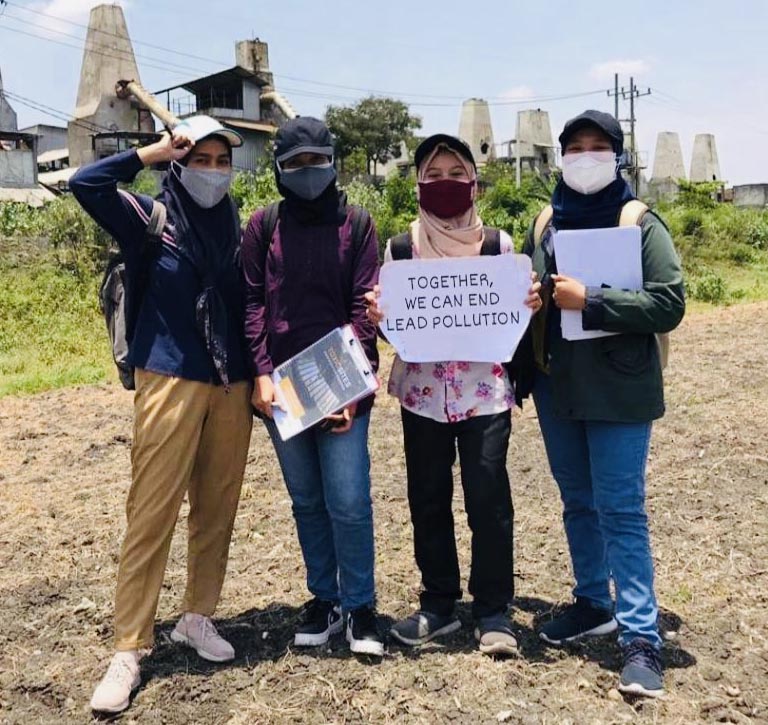
Global Social Media Campaign: To support our ILPPW efforts, Pure Earth organized a social media campaign that was amplified through Pure Earth partners and offices around the world. The campaign engaged communities in every Pure Earth country location, as well as the public in the U.S., receiving around 21.68 million impressions.
Using the hashtag #LeadSolution, the campaign called for concerned citizens and activists everywhere to submit photos of themselves holding up signs that read “Together we can end lead pollution.” Each Pure Earth country office made adjustments to appeal to local audiences. Pure Earth Mexico added the hashtag #SolucionesAlPlomo and the slogan “Together we can eliminate lead from pottery” to highlight the main cause of lead poisoning affecting Mexicans, while Bangladesh took the campaign beyond regular social media channels to reach an estimated 1 million people via SMS.
UNICEF joined in to spread the message about lead and the Protecting Every Child’s Potential (PECP) initiative on their various social media channels, including UNICEF, UNICEF USA and UNICEF Health channels, as did UNICEF country offices in Bangladesh Ghana, Georgia and Indonesia.
PECP Newsletter: A special Protecting Every Child’s Potential ILPPW newsletter edition was released.
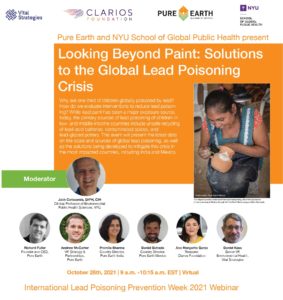
Global Webinar: While WHO’s ILPPW theme this year focused on lead paint, Pure Earth organized a webinar hosted by NYU’s School of Global Public Health to expand the conversation about lead. “Looking Beyond Paint: Solutions to the Global Lead Poisoning Crisis” focused on often overlooked major sources of lead affecting children in low- and middle-income countries, including unsafe recycling of lead-acid batteries, contaminated spices, and lead-glazed pottery.
The event attracted 130 participants from around the world, with speakers from Clarios Foundation, NYU and Vital Strategies joining Pure Earth’s regional experts to discuss solutions to help protect one-third of the world’s children poisoned by lead.
Regional Webinars: In addition, three regional webinars were organized by the Global Alliance on Health and Pollution (GAHP) on lead exposure in Latin America, South Asia, and Africa. Speakers for the events were drawn from Pure Earth’s global offices as well as our network of experts around the world. Almost 200 people attended the three webinars. Learn more about the events, participating speakers, or watch the webinars:
- Exposición al plomo en América Latina,
- Sources of Lead Exposure in South Asia and the Global Implications
- Sources and Strategies to Reduce Lead Exposure in Africa
Bangladesh
Bangladesh is one of the most lead-impacted countries in the world, with the 4th highest rate of death from lead exposure, and about 36 million children exposed to lead. Local officials and partners are eager to address the problem and have been collaborating with Pure Earth on solutions.
Event: A two-hour roundtable discussion brought together stakeholders from across disciplines to discuss ways to come together to address the problem. It was organized in coordination with Pure Earth Bangladesh, UNICEF, the Department of Environment (DoE), the Director-General of Health Services (DGHS), local NGO Environment and Social Development Organization (ESDO), and Prothom Alo, one of the country’s largest media outlets.
The event, “Together, we can end lead pollution, protect every child’s potential,” featured panelists and speakers from Pure Earth Bangladesh, UNICEF Bangladesh, ESDO, icddr,b, the Bangladesh Paint Manufacturers’ Association, and representatives from the Department of Health and Department of Environment.
Panel members emphasized preparing a comprehensive clinical study on the effects of lead on human health, conducting in-depth research on various sources, and developing relevant national policies to address the diverse challenges of lead pollution. Also, they urged aligning laws and frameworks with the SDGs to properly address multi-faceted lead exposure risks, and most importantly, increase public engagement and educational awareness.
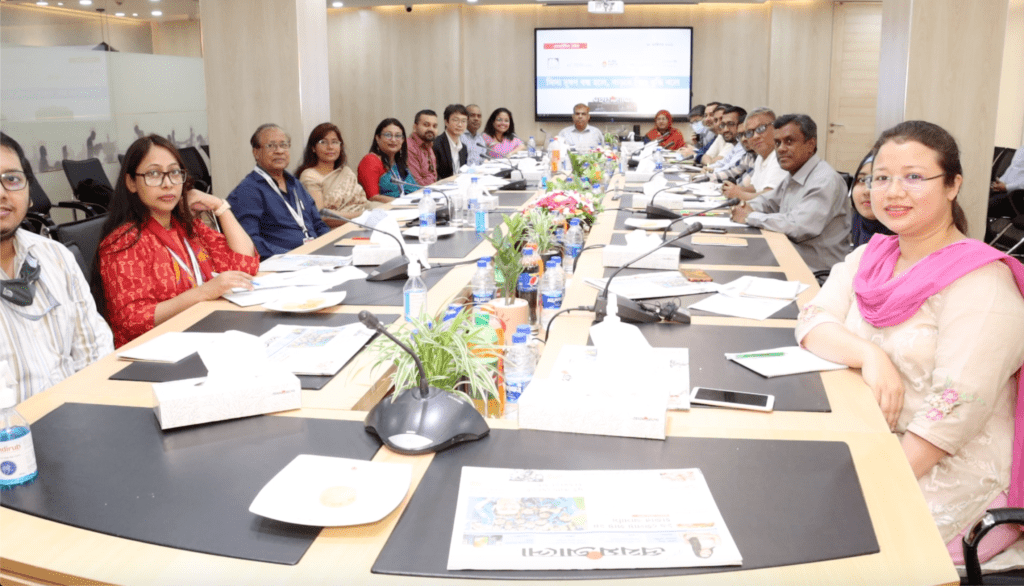
Press outreach: To support the discussion, Prothom Alo, which reaches over 6 million readers daily in its print edition alone, published an Op-Ed by Dr. Rahman. A second Op-Ed about the lead problem was published in the Dhaka Tribune. Along with the roundtable, the two think pieces, and a half page supplement in Prothom Alo in both Bangla and English versions, along with robust media coverage in the local press, contributed to the growing conversation about lead with key decision makers in the country.
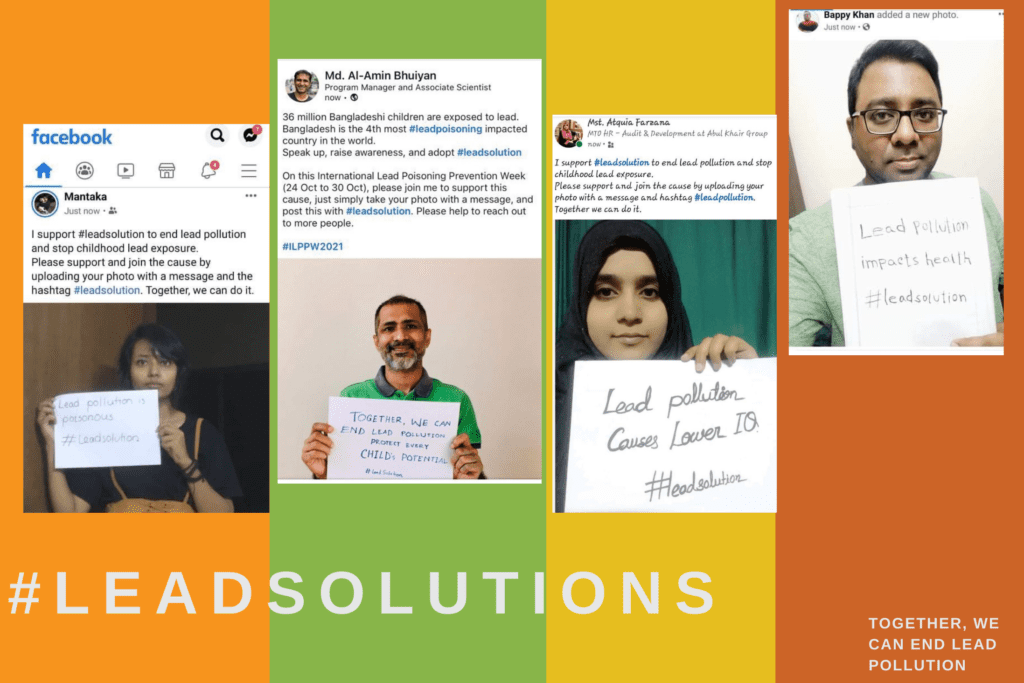
Social Media campaign: To help build public support for official action on lead, Pure Earth Bangladesh produced a new video focusing on lead’s impact on children in the country, and launched it on social media using the hashtag #leadsolution.
Pure Earth Bangladesh developed 25 social media posts with 20 key messages on lead pollution, which reached more than 5,000 people across various Pure Earth and partner social media platforms. In addition, 200 youth representatives joined the #leadsolution campaign on Facebook and Instagram.
SMS campaign: At the same time, Pure Earth Bangladesh collaborated with the Director-General of Health Services, UNICEF Bangladesh, and ESDO on an SMS campaign during ILPPW that reached over 1 million people to raise awareness about childhood lead poisoning.
Ghana
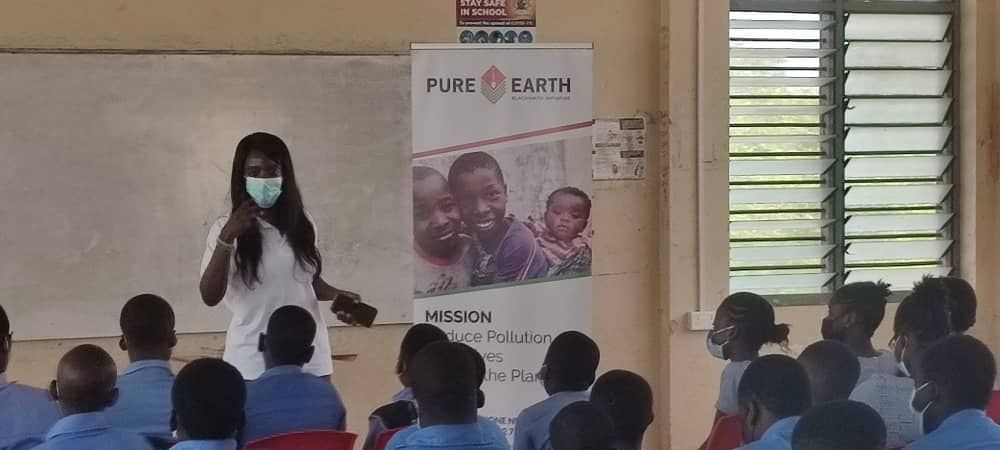
In Ghana, ILPPW events focused on educating children and health care workers with visits to schools and hospitals, as Pure Earth Ghana’s Country Director Elsie Appeadu explained: “I was shocked – there was zero awareness among health care workers, teachers, and families that lead poisoning was an issue… It’s my mission to raise the awareness of the Ghanaian people and solve this problem.”
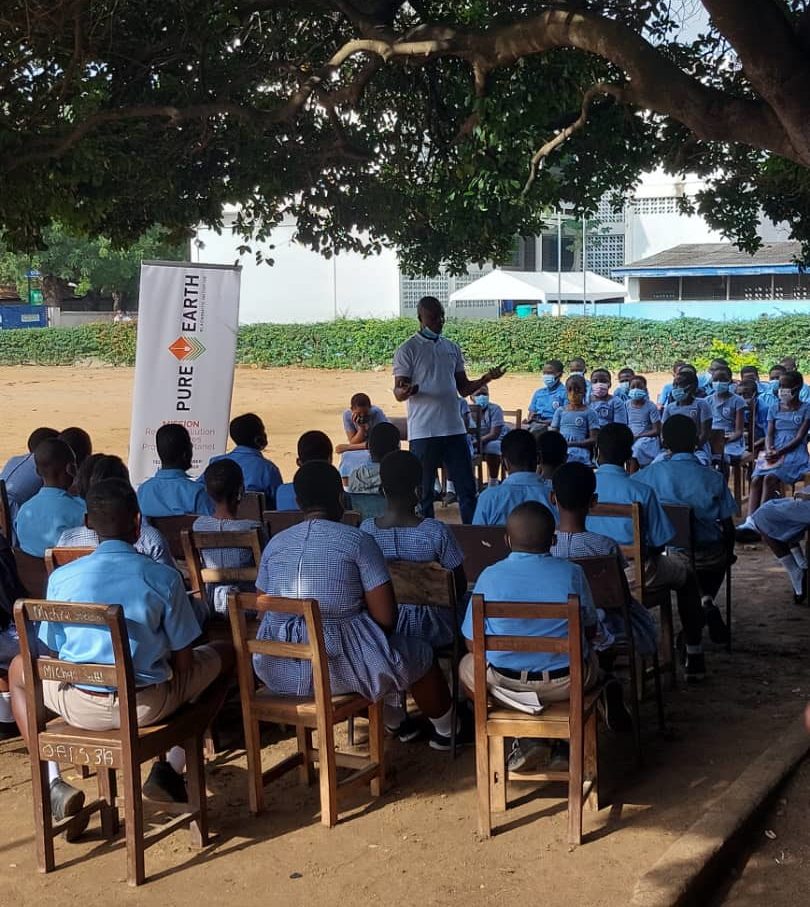
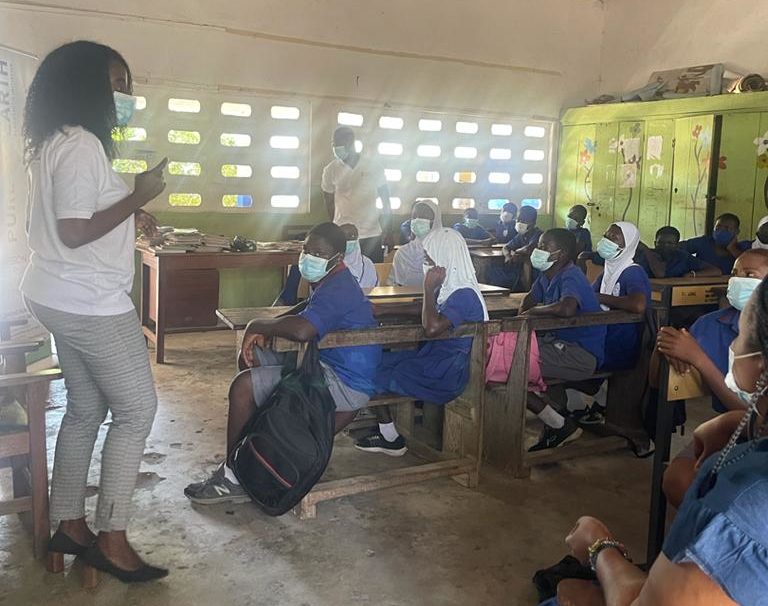
Visits and Talks: Elsie Appeadu and her team visited five hospitals and six schools to talk to healthcare workers and upper primary students and their teachers about lead poisoning. Lister Hospital in Accra streamed the talk on Facebook Live under the banner “critical conversations in healthcare” to reach a larger audience of healthcare workers outside the hospital.
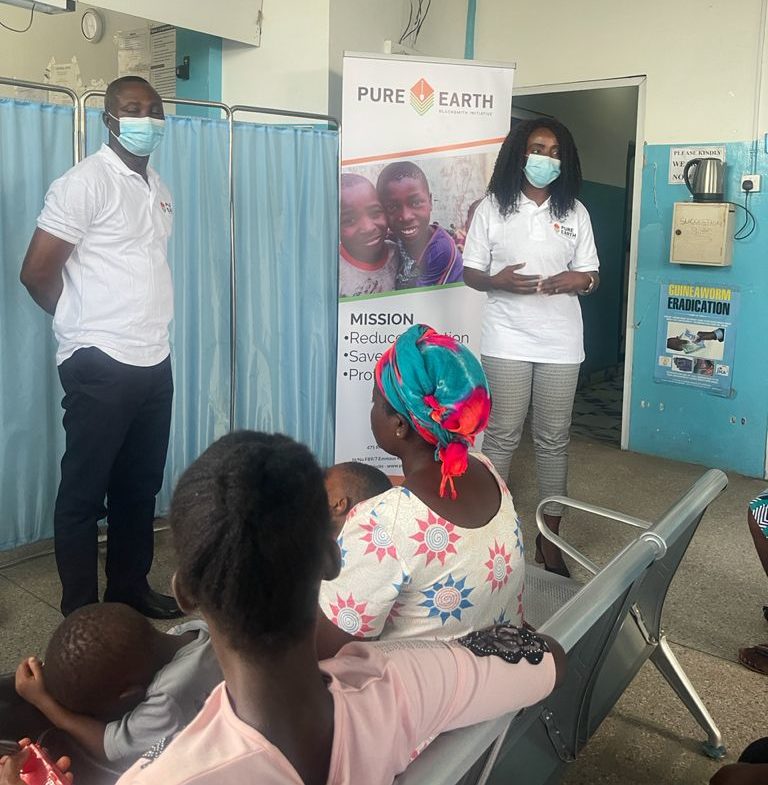
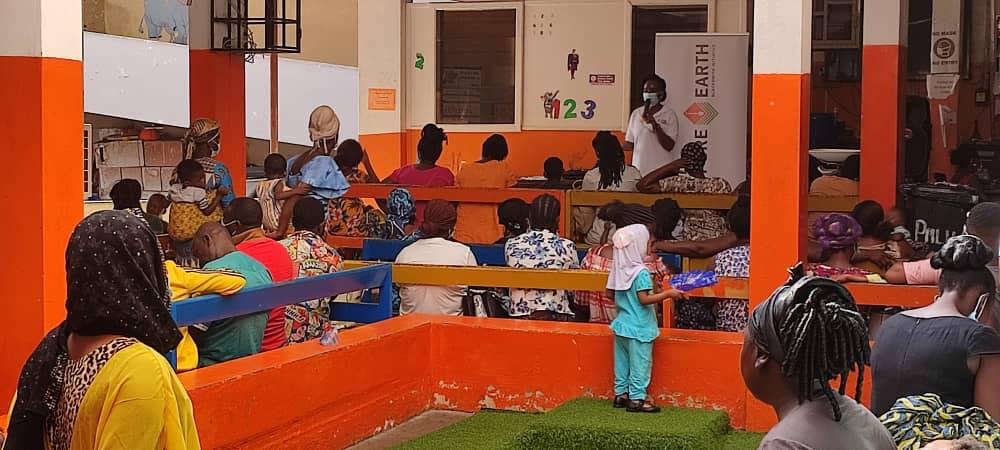
Essay Competition: Following the visits, Pure Earth Ghana held an essay competition open to children from the six schools. The essays gave students the opportunity to display what they learned from the Pure Earth talks. Children wrote about the different sources of lead poisoning, and what they can do to protect themselves, including simply washing their hands. Some students even pointed out the local tradition of pregnant women eating bentonite clay or “ayilo” as a source of lead poisoning. One student ended her essay with this proclamation: “I pledge to set a personal example to others.”
Winners of the competition received trophies. Plans are in the works to establish a Pure Earth school club, which will focus on pollution reducing activities with a particular focus on lead poisoning prevention. This is part of an important strategy to activate families in Ghana.
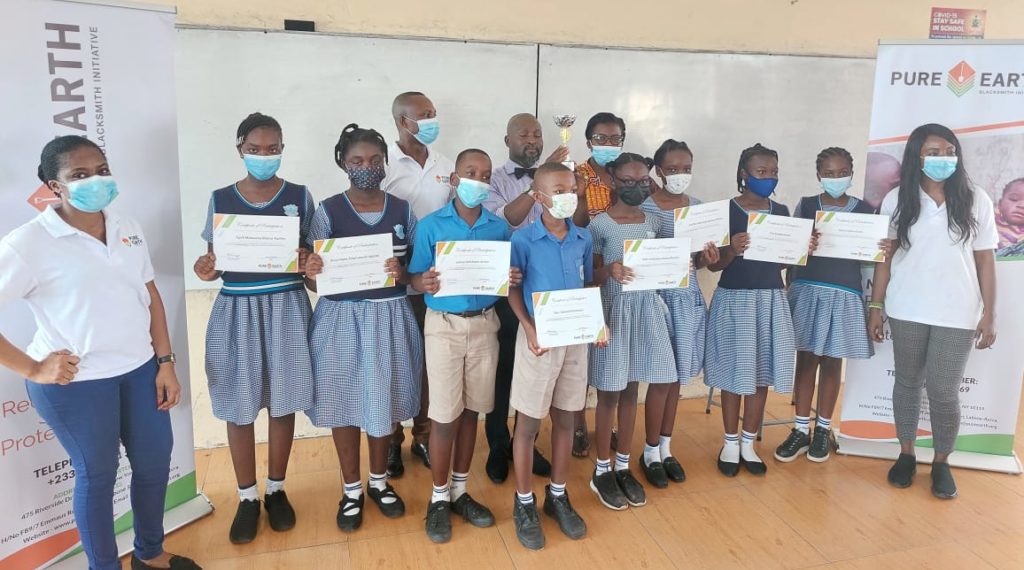
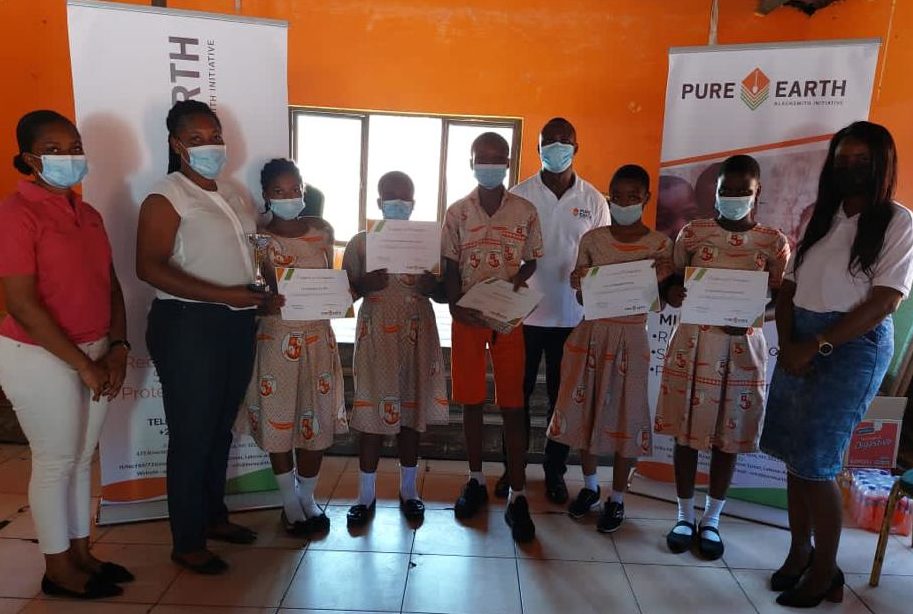
PECP Launch Event: While grassroots outreach was the focus during ILPPW in Ghana, Elsie also connected with representatives from government agencies, civil service organizations, academia and industry during a two-day workshop organized by UNICEF to launch the PECP initiative in Ghana.
The multi stakeholder engagement workshop opened with four keynote addresses delivered by Pure Earth Ghana and representatives from WHO, EPA and UNICEF, with seven presentations from the Ghana Standards Authority, EPA, Factories Inspectorate, Green Advocacy Ghana, Ghana Health Service, Ghana Poison Centre, and Ghana Broadcasting Corporation.
The UNICEF workshop brought together these stakeholders to share key actions being taken to address childhood lead poisoning in Ghana, identify gaps in the national health policy related to lead, and gather feedback from participants, including input on what their individual institutions needed to help them in the effort.
One of the key announcements shared at the workshop was that a national action plan on lead was being drafted by Ghana Health Services. Dr Carl Osei, Program Director at the Department of Environmental and Occupational Health of the Ghana Health Service also outlined details of a proposed study to monitor the yearly blood lead levels of children under 5 years of age living near lead contaminated sites identified by Pure Earth’s Toxic Sites Identification Program.
Elsie noted that many of the stakeholders at the workshop based their plans and decisions on data produced and collected by Pure Earth in the field.
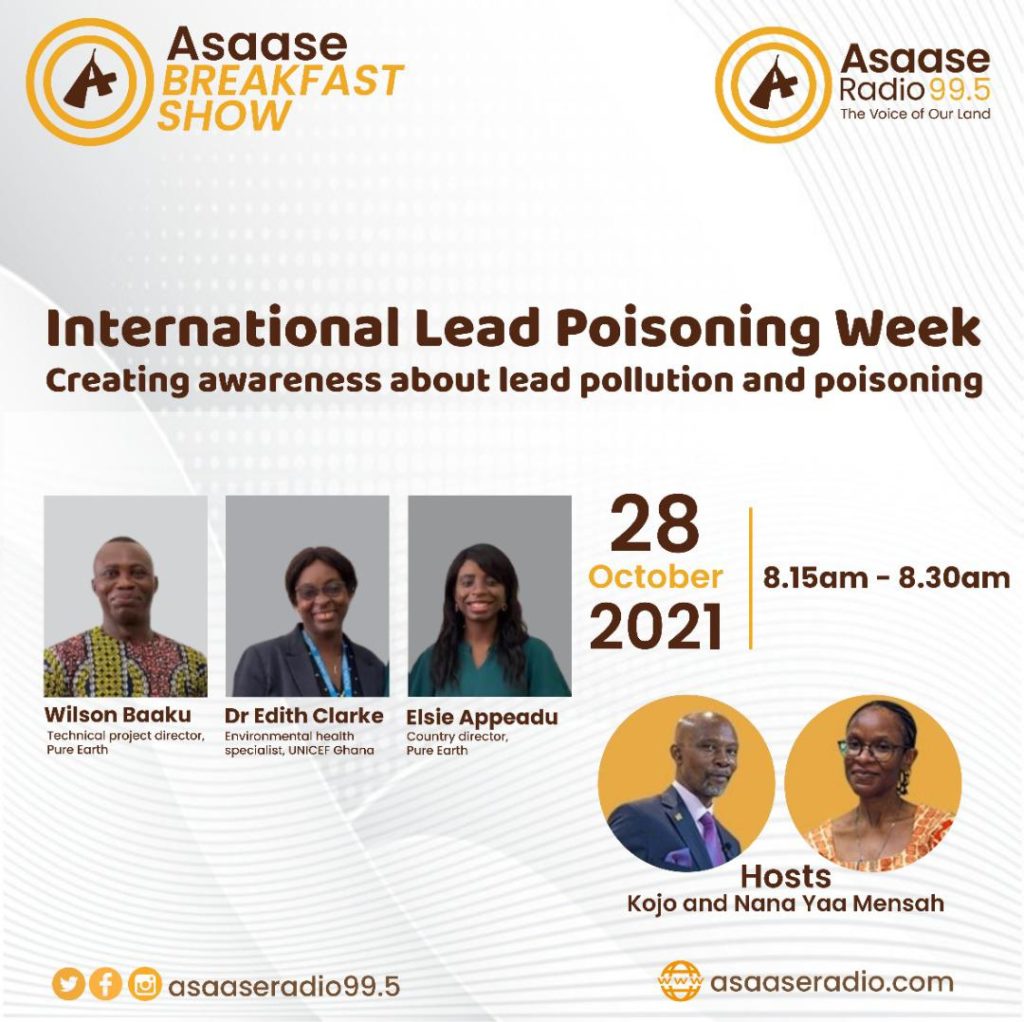
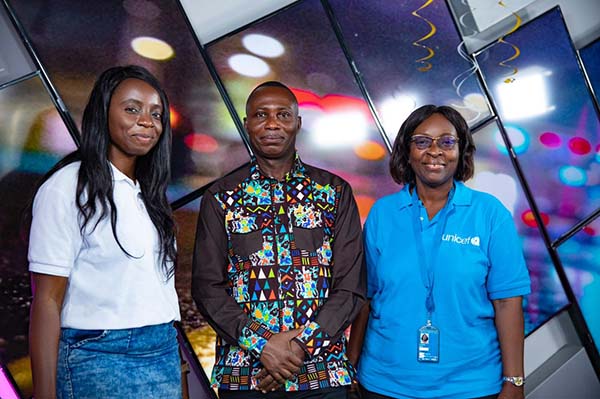
Press Coverage: Pure Earth Ghana’s ILPPW events and the UNICEF PECP workshop were widely covered in the local media, including an article on lead poisoning in the Ghanaian Business and Financial Times, and an interview on the ASAASE Breakfast Show with Elsie Appeadu and Pure Earth colleague Wilson Baaku, along with and Dr. Edith Clarke, Health Specialist at UNICEF.
Indonesia
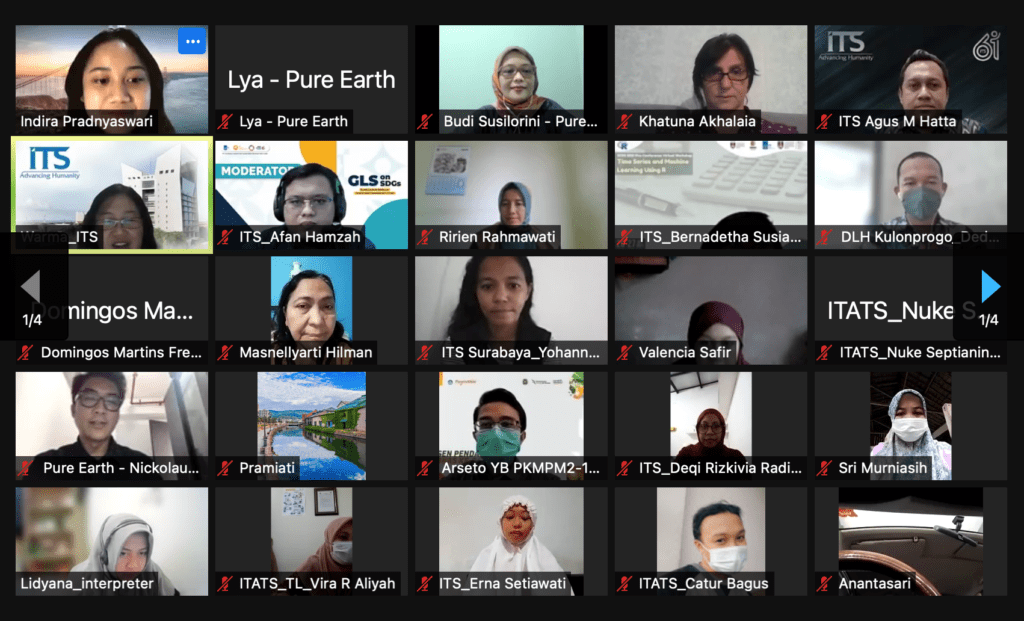
Webinar: In Indonesia, ILPPW activities focused on the theme “Lead: Potential Risks In Our Daily Lives.” A webinar organized with Institut Teknologi Sepuluh Nopember (ITS) Surabaya engaged over 100 participants on the topic, including undergraduate and postgraduate students, researchers and lecturers from universities, representatives from the environmental protection agency on the sub-national and national level in Indonesia, NGOs and other stakeholders.
Budi Susilorini, Country Director for Pure Earth Indonesia, opened the event with an overview of the problem: In Indonesia, about 45 million children under age 14 have elevated blood levels. Between 2009 and 2016, Pure Earth’s Toxic Sites Identification Program found approximately 150 sites in the country contaminated with lead. Rather than well-known sources of exposure like leaded paint, Budi pointed out that the improper recycling of lead-acid recycling batteries is one of the significant toxic problems plaguing Indonesia.
Warmadewanthi, the Director of the Centre for Research of Sustainable Infrastructure and Environment in Indonesia, confirmed Budi’s presentation with a new 2021 study that found that the main sources of lead pollution are the improper recycling of used batteries, followed by mining and lead smelting.
Khatuna Akhalaia from Pure Earth Georgia joined the webinar to share her country’s experience with lead-adulterated spices, a problem that potentially affects people everywhere because of the global food supply chain.
Ms. Akhalaia chronicled Pure Earth’s collaboration with UNICEF in Georgia, which led to the government taking action. The Pure Earth team, with the Georgian authorities, sought out spice sellers and producers, and put a stop to the adulteration ending the distribution of lead-contaminated spices in the country. As a result, just one year after the problem was detected, additional testing by Pure Earth found most spices free of contamination.
PECP Launch Event: The launch of the Protecting Every Child’s Potential (PECP) initiative in Indonesia also took place during ILPPW, hosted by UNICEF. Drew McCartor, Pure Earth’s VP of Strategy and Partnerships, opened the event offering an overview of the problem and solutions that are being implemented in PECP countries around the world. Participants included the Ministry of Environment and Forestry, the Center for Indonesian Medical Students’ Activities, Vital Strategies, Nexus3 Foundation and other stakeholders.
Mexico
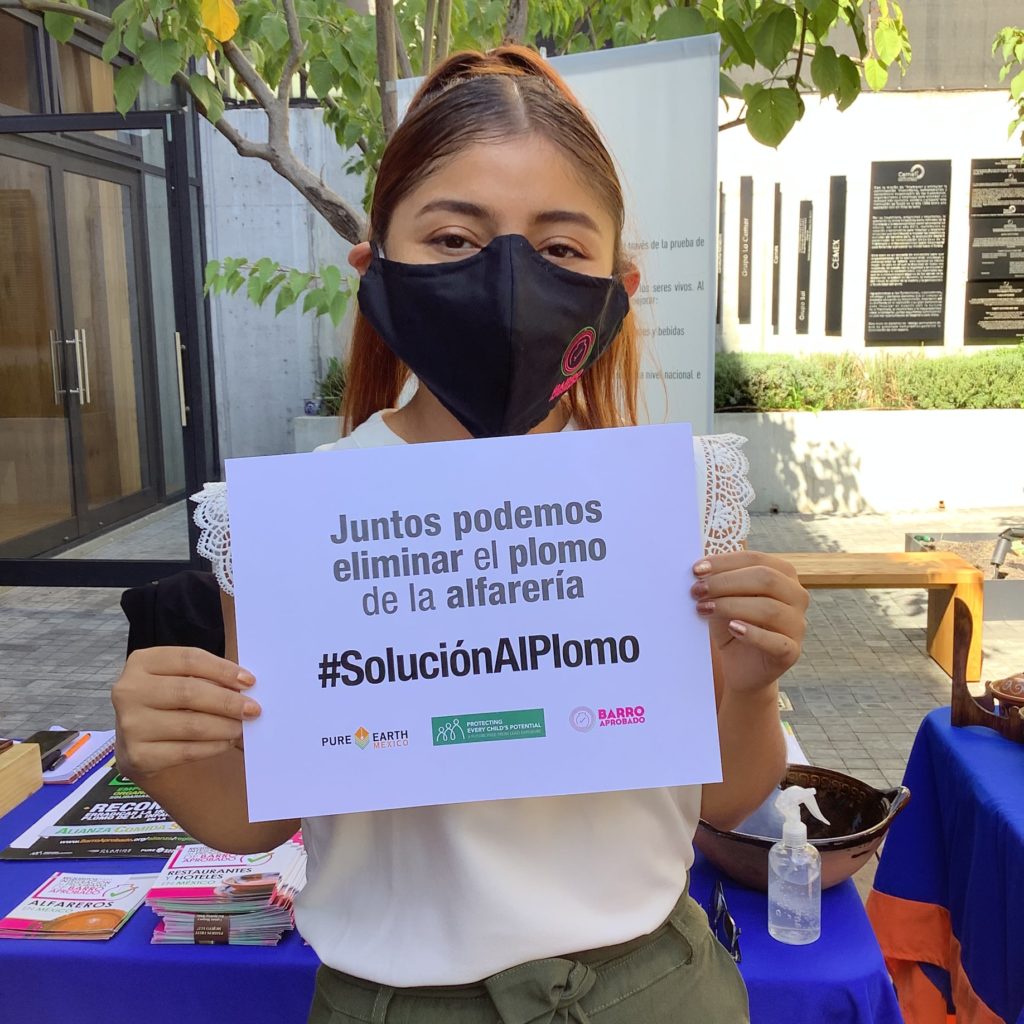
Mexico’s lead problem can be found in almost every home and restaurant in the country. It is traditional pottery glazed with lead, which is widely used to cook and serve food. As a result, many Mexicans are exposed to toxic lead with every meal. In Mexico, 13 million children under age 14 have elevated blood lead levels. In addition to the health impact, Mexico also suffers a 3% loss of GDP to lead in terms of lower productivity, healthcare costs, and the inability to export lead-glazed pottery. Pure Earth Mexico’s ILPPW efforts therefore focused on rekindling the country’s rich pottery tradition with safe, lead-free techniques, and promoting the adoption of lead-free pottery in restaurants and homes.
Launch of Food Alliance: Pure Earth Mexico took the opportunity to launch a food alliance (Alianza Alimentos /Niños sin Plomo) during ILPPW, bringing in poet Homero Aridjis, a pioneer in the fight for the eradication of lead in Mexico, to speak. Aridjis made an emphatic call to those present to join the effort to bring together business owners, civil society organizations, NGOs and the government to achieve a common purpose: to eliminate lead from pottery to reduce the blood lead levels of Mexican boys and girls. His call was met with positive responses from the Autonomous University of Querétaro, the National Chamber of the Restaurant and Seasoned Food Industry, and the Mexican Center for Philanthropy.
Social Media Campaign: The launch of the alliance was supported by a social media campaign informing the public about where to buy lead-free pottery. Using the hashtags #LeadSolution and #SolucionesAlPlomo and the slogan “Together we can eliminate lead from pottery,” Pure Earth Mexico was able to spread the message on Instagram and Facebook with the help of various environmental organizations, potters, local influencers and even public officials.
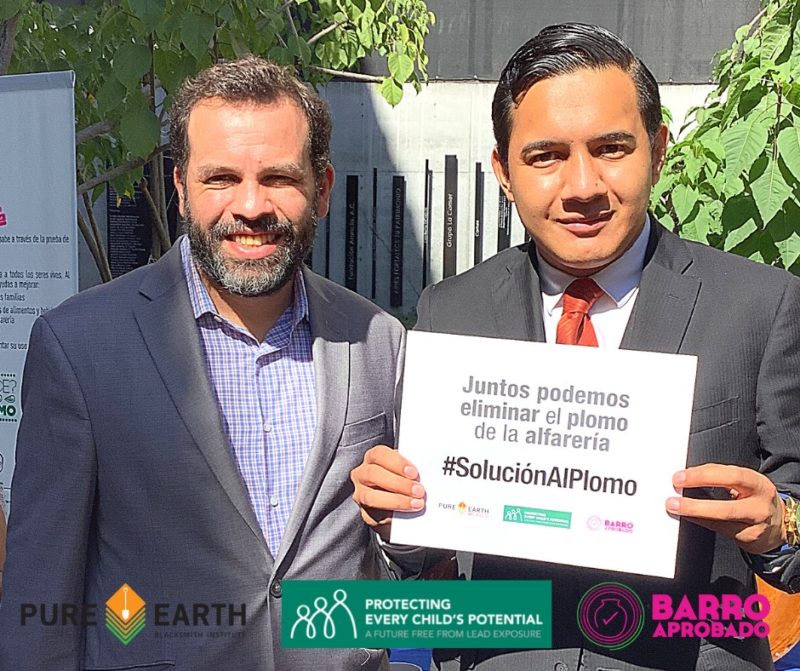
Press Coverage: The effort was widely covered in the local press, including stories in La Jornada and Mexico News Daily which helped to raise awareness about this threat in the daily lives of millions of Mexicans.
Global Webinars: In addition, Pure Earth Mexico participated in two global webinars to spotlight the problem of leaded pottery in Mexico. In Exposición al plomo en América Latina, organized by GAHP, Pure Earth Mexico and the Mexican lead poisoning specialist Dr. Mara Téllez joined experts from Uruguay and Argentina to discuss the impact of lead across Latin America.
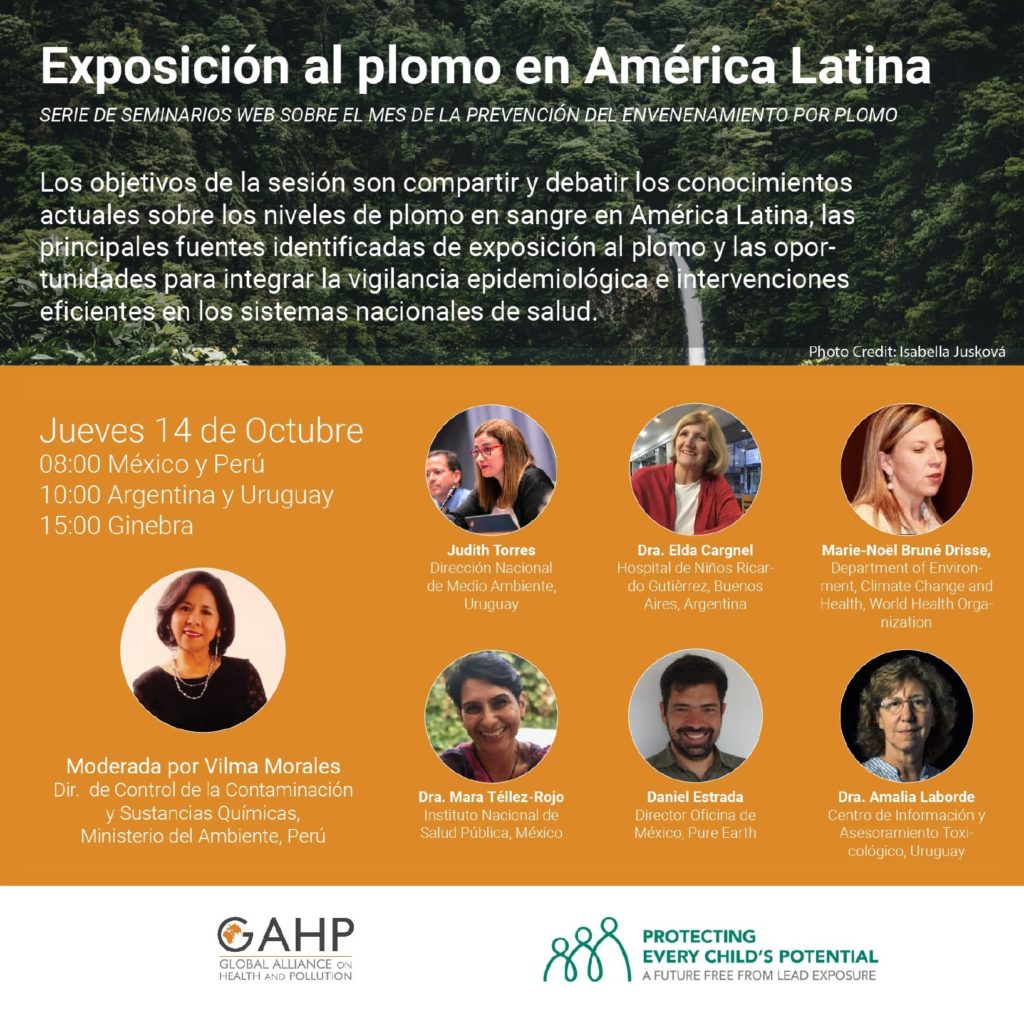
In Looking Beyond Paint: Solutions to the Global Lead Poisoning Crisis, Pure Earth Mexico joined a panel of experts to discuss sources of lead exposure such as traditional Mexican pottery, species adulterated with lead, and the informal recycling of car batteries.
Learn more: LA SEMANA DE LA CONCIENTIZACIÓN POR UN MUNDO LIBRE DE PLOMO.
Philippines
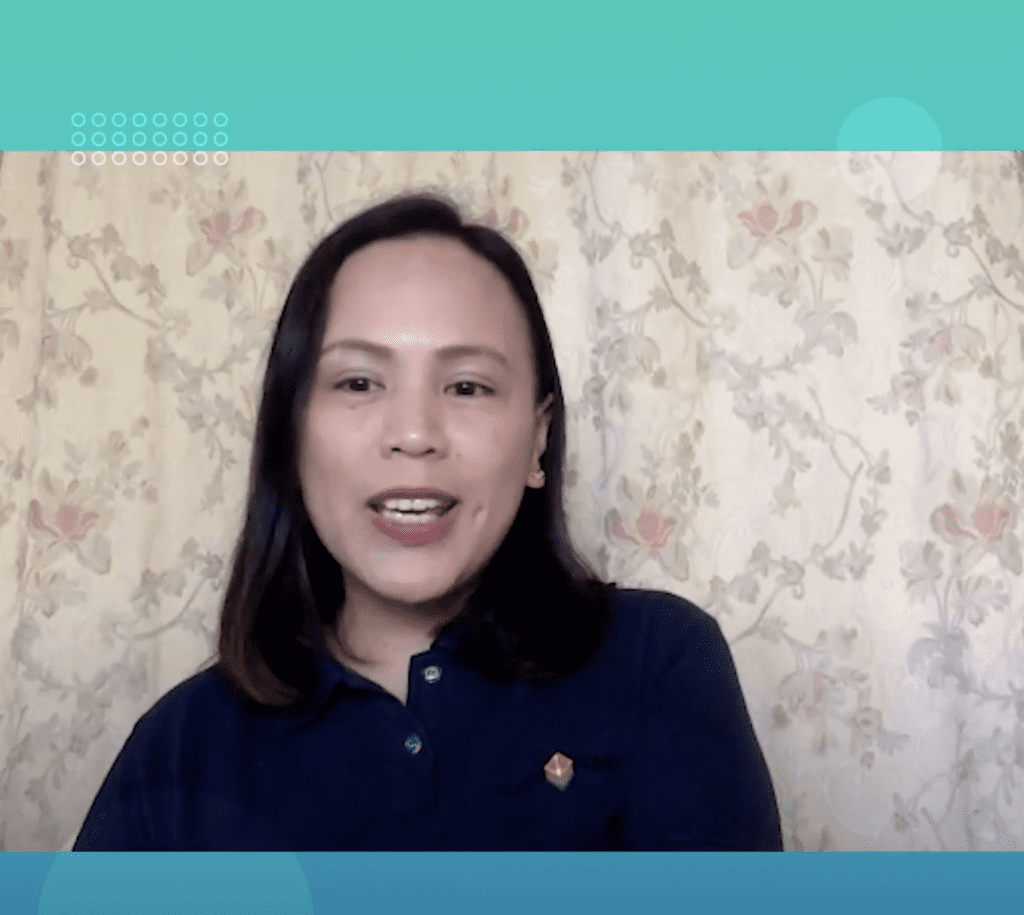
In the Philippines, G Diaries, a multi-awarded advocacy show from the ABS-CBN Foundation, selected Pure Earth Philippines for an episode of World Changers, which features organizations that have made significant contributions to Filipino society. The episode included an interview with Pure Earth’s Larah Ortega Ibanez talking about childhood lead poisoning in the Philippines, and the impact of Pure Earth’s work in communities across the country. Watch the episode here.





